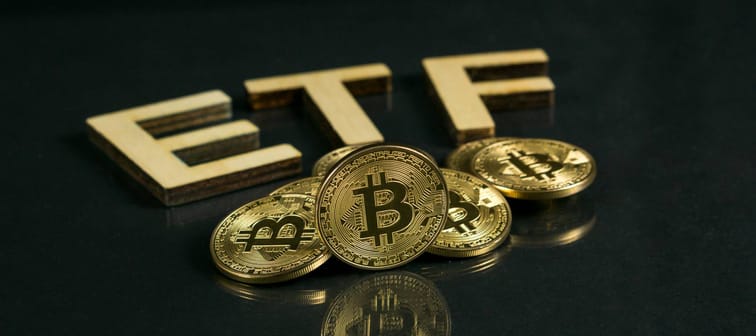Cryptocurrency has been a hot topic since bitcoin’s massive run-up (and subsequent drop) in 2017. Now, this popular coin has surpassed $65,000 CAD and it’s become more widely accepted as a serious investment. Cryptocurrency is not yet mainstream enough to be able to purchase it directly in your brokerage account. However, you can buy Exchange-Traded Funds (ETFs) that invest in Bitcoin, which is the next best thing.
The Toronto Stock Exchange recently made history by approving the first bitcoin ETF in North America. Not only does this new Bitcoin ETF make bitcoin more accessible to the average investor, but it also gives you the opportunity to purchase shares in tax-sheltered accounts like a TFSA or RRSP. This allows investors to tax-shelter their capital gains in cryptocurrency!
But despite this exciting news, there are questions that linger. Are Bitcoin gains taxable in Canada? Can CRA track bitcoin? Finally, should you put bitcoin in your TFSA or RRSP at all? I’ve got answers to all your burning questions about TFSAs, RRSPs, Canadian taxes, and Bitcoin.
Should you hold bitcoin in your registered account?
First, you need to understand how the new Bitcoin ETF works. The Prosper Investments bitcoin ETF, BTCC.TO, is the first cryptocurrency ETF to be approved in Canada and trade on the Toronto Stock Exchange. The fund charges a 1% management fee and is invested solely in bitcoin. This makes it easier than ever for the average investor to take a position in Bitcoin.
ETFs are investment securities that trade on the market exchange like a single stock. Typically they invest in multiple assets, but the bitcoin ETF only holds Bitcoin. Buying shares in the bitcoin ETF allows you to invest in the cryptocurrency through your brokerage with the same ease as any other publicly traded security.
The bitcoin underlying BTCC is held in cold storage by Gemini Trust Company, one of the most recognized and respected players in the cryptocurrency landscape. This keeps the bitcoin behind the ETF much safer than that held on a crypto exchange platform, which is vulnerable to hackers. Because investors purchase shares directly through their brokerage, they also don’t need to worry about the hassle of managing their own asset storage. For anyone that felt overwhelmed or confused by digital and hardware crypto wallets, this removes the headache!
But here’s the really exciting news: the new bitcoin ETF lets you buy bitcoin in both registered and unregistered accounts—meaning you can tax-shelter your investment in a TFSA or RRSP.
If you’re a Bitcoin investor, it’s a smart move. In the interest of diversifying your portfolio across multiple assets to gain exposure to both existing and emerging markets, consider allocating a small percentage of your TFSA or RRSP to invest in bitcoin. As little as 1% or 2% is enough to give you a little bit of skin in the game, without putting your entire investment portfolio at risk. Cryptocurrency remains a volatile and speculative investment, but its acceptance is only growing so despite its risks, you cannot afford to ignore it.
How to buy bitcoin in your TFSA & RRSP
Bitcoin and other cryptocurrencies are still not fully recognized by traditional banks and brokerages as legitimate currencies. As a result, you cannot buy Bitcoin directly in registered accounts like the TFSA or RRSP. But you can buy an ETF that invests in Bitcoin in these accounts!
The Purpose Bitcoin ETF is available to trade on the stock market, so if you want to buy Bitcoin in your TFSA or RRSP, this is the way to do it. You’ll need a TFSA or RRSP brokerage account in order to access the stock market.
In Canada, Wealthsimple Trade and Questrade both offer excellent low-commission trading platforms, and it’s free to buy ETFs on both. Simply open a TFSA or RRSP trading account with your brokerage of choice, and purchase shares of BTCC.TO when the market opens.
Wealthsimple Crypto makes it easy and cheap. Using the Wealthsimple Trade app, you can buy and sell bitcoin and Ethereum anywhere, anytime without paying any commissions. It’s also a secure platform: coins are held by Gemini Trust Company, a regulated crypto custodian with $200M in cold storage insurance coverage.
Do I have to claim bitcoin on my taxes?
It depends. If you bought the bitcoin ETF in your TFSA or RRSP, the gains are tax-sheltered and you do not have to claim bitcoin on your taxes. Thankfully, the new bitcoin ETF provides a perfectly legal way to reduce—or even eliminate—income taxes on your cryptocurrency if you hold it in a TSFA or RRSP.
However, if you do not hold bitcoin in your TFSA or RRSP, cryptocurrency gains on cryptocurrency exchange platforms are taxable. The CRA recognizes cryptocurrency gains as either business income or capital gains, depending on the circumstances. In either case, any realized gains from selling cryptocurrency for a profit are subject to income taxes. So if your bitcoin isn’t in a TFSA or RRSP, you do have to claim bitcoin profits on your taxes.
One of the draws of cryptocurrency is its anonymity and lack of regulation by governments. Unlike traditional bank and brokerage accounts, you do not need to provide your Social Insurance Number to open a cryptocurrency trading account on an exchange platform. Because of this, the CRA cannot easily monitor your contributions, withdrawals, or holdings in cryptocurrency exchange platforms or wallets. But this doesn’t mean they can’t find out later. If you think you’re circumventing Canadian tax law by hiding crypto profits on trading platforms, you’re in for a rude surprise if you’re audited.
Will I have to pay capital gains selling bitcoin in a TFSA or RRSP?
No! Gains or losses are only realized if you sell an investment that’s not in a tax-sheltered vehicle (like a TFSA or RRSP). Holding cryptocurrency that increases in value doesn’t trigger any income taxes, but you are subject to income taxes when you sell your investment. Unless that investment is in a tax-sheltered account like the TFSA or RRSP.
All capital gains are tax-free in a TFSA. If you buy the bitcoin ETF in your TFSA and it increases in value, you’ll never pay any income taxes on those gains. Alternatively, capital gains are only tax-deferred in an RRSP. If you buy the bitcoin ETF in your RRSP and it increases in value, you won’t pay any income taxes on those gains until you actually make a withdrawal in retirement. How big your tax bill is will depend on your income in retirement.
What are the risks of buying bitcoin in my TFSA or RRSP?
Despite the draw to tax-shelter your Bitcoin in a registered account, there are serious downsides to investing in bitcoin in a TFSA or RRSP. Cryptocurrency is still a high-risk, speculative asset that is incredibly volatile. Despite its popularity right now, it can still rapidly decline in value. If bitcoin goes to zero, there’s no protection for investors. Your money is gone.
Capital losses in registered accounts like the RRSP or TFSA are of concern because they can impact the contribution room. If you gamble in your TFSA or RRSP and the investment goes south, that money is gone forever. An investment loss is not the same as a withdrawal: you don’t recoup the contribution room the following year!
ETFs are typically tools to protect against volatility by investing in a variety of investments, but that’s not the case with the bitcoin ETF. BTCC is only invested in one single asset: bitcoin. If bitcoin goes down in value, so does the ETF. For this reason, you should treat investing in BTCC the same as you would investing in a single stock.
It’s also worth noting that you can only trade BTCC during market hours. Cryptocurrency never sleeps, and many big run-ups or crashes happen in the middle of the night or on weekends when the traditional stock market is closed. If you’re looking to actively trade bitcoin, you’ll find doing so with shares of an ETF extremely limiting simply from the restrictions of market hours.
The verdict: Should I buy the bitcoin ETF in a TFSA or RRSP?
BTCC is a great way to add a position of bitcoin to your overall investment portfolio, and it’s a great way to do so in a tax-optimized way in a registered account. However, while the ETF makes it easier than ever to invest in bitcoin, it doesn’t eliminate the risks of investing in cryptocurrency. Investors should take a balanced approach of adding a small amount of cryptocurrency to their portfolio, while still focusing the bulk of their wealth on the traditional stock market.






